- Home
- Jeanne DuPrau
The Diamond of Darkhold Page 10
The Diamond of Darkhold Read online
Page 10
“Write?” said Maggs. “I don’t write.”
“You mean you don’t know how?”
The shepherd shrugged and scowled. “Never wanted to,” she said.
An idea began to form in Lina’s mind. “I could help you,” she said. “If you take me back toward Sparks tonight, even just part of the way, I would write a message for you to send to your brother.”
“No point in that,” Maggs said. “He can’t read.”
The wind turned colder and rustled the leaves of the trees. The red light in the west faded to a dusty orange, streaked with dark purple clouds. Lina thought fast. “I could draw the message,” she said.
“I told you,” said Maggs. “I don’t travel at night.”
“But it isn’t quite night yet,” Lina said. “We could go at least a little way.”
“Not very far,” said Maggs.
“Please,” said Lina. “I’ll draw a really good message for your brother. Watch. I’ll do it.”
Lina pulled her pencil stub and a scrap of paper from her pack. “I need something flat to draw on,” she said. Maggs unhooked a bucket that hung from the side of her wagon and turned it upside down. Lina drew this:
“You put words on it,” Maggs said. “I told you he can’t read.”
“Oh,” said Lina. “I forgot. Well, it doesn’t matter. The drawing is clear without them.”
“What do they say?” the shepherd asked.
“They say, ‘Brother—I’m quitting. Get your own food. —M.’ ”
Maggs put a finger on the last letter. “That isn’t M,” she said. “I know M when I see it.”
“Oh, oops,” Lina said. “I wrote it wrong.” She added a big M right next to the L, thankful that her last name was Mayfleet. “Now,” she said, “all you have to do is wrap it in a rag, and put a rock with it, and throw it down where you dropped your supplies.” Maggs reached for the message, but Lina pulled it back. “You have to promise to take me home,” she said.
“Sorry,” said Maggs. “The answer is no. I’m not going your direction anyway. I’m heading south. You need to go southwest.”
“Oh, please,” Lina said. “It’s so important!”
“Can’t do it,” said Maggs. “I’ll tell you what, though.”
“What?”
“You can walk with me until it’s dark and then camp with me tonight. Sleep in the wagon, out of the rain.”
“But that will take me the wrong direction, out of my way.”
“Not far,” said Maggs. “It won’t be more than half an hour before it’s dark and we have to stop.”
It was so terribly frustrating—Lina wanted to go, to travel, right now. But it was just not possible, unless she wanted to risk never getting home at all. She would have to accept Maggs’s offer, even though it would take her out of her way and she’d need to backtrack some in the morning. “All right,” she said. She held out her drawing, but just as Maggs’s hand reached for it, she snatched it back again. Another idea had struck her. Only her panic had kept her from thinking of it before. “That book!” she said. “That book you sold to my friend Doon! I’ll give you my drawing if you’ll tell me where you found it.”
Maggs shrugged. “Sure,” she said. “No reason not to, if you already know about that underground city. Give me the message, and then I’ll show you the place.”
Lina handed it over.
The shepherd went to the back of her wagon and burrowed around inside. Lina could hear her humming, and now and then the hum became a song with a few mumbly words. It was the same tune Maggs had been humming the first day she came to Sparks, the tune Lina had recognized from somewhere. What was it?
When Maggs emerged, carrying a greasy rag, Lina asked her.
“Oh, an old song that lots of roamers know,” Maggs said. “It used to be a sort of riddle, but it isn’t anymore. Not to me.”
“Will you sing it for me?” Lina asked.
In her croaky voice, Maggs sang:
“There’s buried treasure in the ancient city.
Remember, remember, from times of old.
What’s hidden will come to light again,
A diamond jewel more precious than gold.”
Maggs grinned. “The reason it’s not a mystery is, we found the city, me and my family, and we found the diamond, too. Hah! So the riddle’s solved.” She tied up Lina’s message in her rag, along with a rock. “I’ll go toss it down,” she said. She handed Lina her stick. “You keep an eye on these woolies; don’t let them stray.”
Lina watched as she trudged up the mountainside toward the crack in the wall. She pondered the song. It was the one she’d heard from the roamer on the way back from her journey to the ruined city during the summer. The same song—and yet something was different about the way Maggs sang it. The words weren’t exactly the same, were they? Lina couldn’t remember. But she was too cold and tired to think about it now. She crossed her arms over her chest, hugging herself against the wind, which was gaining force. If I’m lucky, she thought, Doon will see that message and know that help is coming. And I’ll know where Maggs found the book that got us into all this trouble.
CHAPTER 12
________________________
Feast Night
Doon sat glumly on an old armchair that smelled of ashes and watched as Minny worked on the fire. She scraped at it with a rake that must have come from one of the greenhouses, pulling coals toward the rod they’d set up over two stacks of stones. Every time she came near Doon, she skittered past without looking at him, as if she was afraid he might stick his legs out and trip her. She fluttered her hands, patted her chest, and plucked at the hair at the back of her neck. She was the most nervous, twittery person Doon had ever seen. Trogg directed her with waves of his arms and shouts. “More fuel over there! Bank it up here! Quicker, Minny! Stop flittering!”
Behind Minny, the lame boy drifted silently around, fetching and carrying when she told him to.
“What’s his name?” Doon asked Trogg, pointing to the boy.
“Scawgo,” said Trogg. “He had another name, but I changed it to go with the names of my kids.” He turned away from the fire and planted himself in front of Doon. “See, I’ve picked up a lot of information about the ancient world in my time. Want to know anything, just ask me. I named my kids after ancient cities. There was New Yorick, and there was Kanza City, and there was Scawgo. Of course, lots of others. But I like the sound of those. Gave my wife a new name, too. She used to be Cora; now she’s Minny, after a city called Minny-Apple. In those ancient places, Drood,” he said, “there was power. I honor power. I draw it toward me, as I am a naturally powerful person.” He stood tall and puffed his chest out. “I chose my own name,” he said, “from the most powerful city of all: Washton.”
Doon remembered looking at the map in the book Edward Pocket had shown him. He was pretty sure that Trogg didn’t have the names of the cities quite right. “In a book I read—” he said, but Trogg interrupted him.
“Oh, books,” said Trogg. “Used to be very useful.”
“Yes,” said Doon. “So if you looked in this book, you could see that those cities’ names were actually—”
“I mean useful for fuel,” Trogg said. “Pretty much gone now, though. We burned ’em up ages ago, where I come from.”
“Burned them up?” Doon was horrified. “Why?”
“Because what’s the point of them? Full of squiggles. People have a lot more important things to deal with than figuring out squiggles. Matters of survival, Droon.”
“But in books, you can find out what people have discovered. You can find out how things work, and—”
Trogg pointed a finger at Doon. “You listen to me,” he said. “We know how things work. We don’t need any squiggles to tell us.”
“But if you would just even read the names of the cities—” Doon began.
“We don’t read,” said Trogg shortly. “So quit yapping about it. We don’t approve of reading; we stopped
doing it long ago. It’s a useless trick. Everything we need to know came down to us from our fathers and our grandfathers and their fathers before them.”
Doon understood. Where Trogg came from, people didn’t know how to read. He blinked in amazement, but he didn’t say any more about it.
Minny bent over the pot of water, poking a long fork at the potatoes boiling in there. She seemed to be afraid of Doon. When he clanked over to look at what was cooking, she edged away from him, her hand fluttering at her throat, her face turned away. Doon went back to the smelly armchair and sat down to wait.
Trogg bent over a box of stuff near the fire and burrowed through it, tossing things out left and right, muttering furiously. “It’s not here,” he said at last, resting back on his heels. “Minny! Where’s that little bottle of salt?”
Minny and Scawgo were sitting facing each other, with a short board between them on which they were chopping up some soggy-looking onions. She glanced up at Trogg with tears dripping from her eyes and said, “It’s upstairs, husband. In the kitchen.”
“We need it,” Trogg said, glaring at her and Scawgo.
“Of course,” said Minny. “We’ll just put this down—don’t let that onion roll off, Scawgo. Hold the board steady—whoops, the knife is sliding—”
“Never mind!” Trogg bellowed. “I’ll send the new boy.” He turned to Doon and stared hard at him. “Go upstairs,” he said. “Get the little green bottle from the table in the kitchen. Do not even think about touching anything else. You will be searched when you return.”
So Doon hobbled off toward the apartment and climbed the stairs, his chain clanking the whole way. He found the bottle of salt on the table and put it into his pocket. Now. He was alone; no one was watching him. There must be some way he could use this moment. Could he go out a back window? But with his feet chained, he wouldn’t be able to land right. The two-story drop would probably break his ankles or wrists. Could he steal something useful, some kind of weapon, a knife, a hammer? But Trogg was going to search him; he’d find it right away. What else, what else? Doon swept his eyes around the apartment—the main room with its beds and couches and armchairs all crowded together at crazy angles, the kitchen with dirty mugs standing on the table, and smeared spoons, and the cabinets full of bottles and cans . . .
A thought came to him. The kitchen was where Trogg had stashed Scawgo’s treasures. Up high somewhere. If Doon couldn’t help himself here, maybe he could help the boy. Quickly, he flung open the doors of all the upper cabinets to see what was on their top shelves. Nothing in the first one, nothing in the second, but in the third, he saw a cloth sack way up on an other wise empty shelf near the ceiling. He’d have to guess that it held Scawgo’s little collection.
He dragged a chair over to the kitchen counter. If his feet hadn’t been chained, he could easily have stepped onto the chair and from there to the counter. But the chain made it impossible to separate his feet enough to get one of them onto the chair at a time. So, with both hands on the counter, he hoisted himself up, bending his knees until his feet rested on the chair’s seat. When he stood up and raised an arm, he found the top shelf still out of reach. He turned around with small clanking steps, sat on the counter, swung his feet up, and with some difficulty stood up again. This time, stretching his arm high, he managed to grab the sack with two fingers. He pulled on it and caught it as it fell.
Once he was down again, he took just enough time for one glimpse inside the sack—he saw something glittery and some papers—to feel sure enough that he’d got the right thing. Then he crossed the room with it and pushed the sack deep under the striped couch.
Back down the stairs—the quickest way was to sit down and slide—and out to the fire, where he handed Trogg the salt bottle.
“Took you a while,” Trogg said.
“Chained feet,” said Doon. “You should try it.”
Trogg patted him all over to make sure he hadn’t stolen anything, and Doon sat down again in the smelly chair and continued to wait for dinner.
Finally, on Gilly Street, he saw the two lights that meant Yorick and Kanza were coming back. It was clear from their excited cries that whatever they’d brought with them was dinner.
“We got it, Pa!” Yorick exclaimed as they pulled the wagon up close. “It was just where it was supposed to be. A bunch of other stuff, too.”
Minny peered into the wagon and nodded. “Mmmhmm,” she said. “Yes, very good, oh, very good.”
“So let’s get going!” cried Kanza. “I’m starving!”
Doon got up out of the chair to take a closer look. In the wagon, he saw some lumpy sacks and also what seemed at first to be a heap of wool.
Yorick reached in and with a grunt lifted the wool in his arms. Doon saw a head, and legs hanging down. A sheep! he thought. No, a lamb—it was smaller than a full-grown sheep. And it didn’t move; it was asleep or dead. Where had it come from? Had they gone up out of the cave to get it?
Yorick and his father laid the lamb down on the pavement not far from where Doon was sitting. Minny and Kanza stood nearby. From a bucket full of tools, Trogg took a couple of long knives, and he and his son set to work cutting off the lamb’s head. They cut off the four hooves next, kicking them aside, and then, with great wrenchings and gruntings, they peeled away the woolly skin until the lamb was a slippery red slab with sticklike stumps where the head and legs used to be.
Doon knew that people ate animals. They never had in Ember; there were no animals there. But in Sparks, in the winter, his father had now and then brought home from the market some chunks of chewy, salty stuff that was called meat. Doon had been astonished when he was told it was made from animals and had been saddened as well; the animals were new and fascinating creatures to him, and it was hard to accept that they were killed for food.
Now, watching the Troggs turn the lamb into meat, he had to press his hands against his mouth to keep from making a sound.
While Trogg was cutting up the lamb, Yorick and Kanza heaved the sacks out of the wagon and opened them. Inside were a lot of potatoes with dirt still on them; a few big, flabby cabbages; and several smaller sacks that Yorick peered into, announcing the contents of each: “Dried corn. Some kind of beans. Some kind of grain. Ewww! Mushrooms.”
Kanza held up a small rag bundle. “This was on top of the rest,” she said. “It’s tied in a knot.”
“Well, untie it, picklenose,” said Trogg, who was busy sticking the lamb’s body onto the skewer over the fire.
Kanza opened the bundle. “A rock,” she said. “We have enough rocks, if you ask me.”
But something fluttered out—a scrap of paper. Kanza stooped to pick it up. She squinted at it. “It’s a picture,” she said. “Look, Pa.”
Trogg came over to see. So did Minny, hugging herself with her skinny arms as she passed Doon. Yorick peered over Kanza’s shoulder, and Doon, too, clanked over to see.
“There’s words on it,” said Yorick.
“Someone else must have written them for her,” Trogg said. “Strange. Why would she want words? Who would be up there anyway?”
“So what does it mean, Pa?” asked Kanza.
Trogg took the candle from his cap and held it near the paper. “It means,” he said. Then he was silent for a while. “It means she is going away.”
“Oh, alas!” cried Minny. “Leaving us? For good?”
“Well, who knows?” Trogg said. “Looks like it, though. She’s waving.”
“But what about the words, Pa?” asked Kanza.
“Pass it over to him,” Trogg said, nodding toward Doon. “He likes to waste his time with words.”
Kanza handed Doon the paper. Silently, he read the message.
“So?” said Kanza. “What does it say?”
With an effort, Doon kept himself from smiling. He could see that Trogg was listening, though he was pretending not to, so he had to think of something fast. He frowned over the words, as if he was having trouble making them out. Th
e curly bits of the drawing were clearly sheep. The person who was dropping supplies from up above must be a shepherd. It did look as if the shepherd was waving goodbye. He thought of making up something that might help him, such as, RELEASE THAT BOY IMMEDIATELY! Or GET OUT! BANDITS COMING! But he had to make the words go with the picture, or they wouldn’t believe him. Best to play it safe, he finally decided. “It says, ‘Goodbye! I’m leaving. No more from me.’ ”
Minny wailed.
“Don’t be an idiot,” Trogg said. “Who cares? We’ve got enough for a long time. Don’t forget what we found the other day.”
“Oh, yes,” said Minny, cheering up.
“What did you find?” asked Doon.
“A little hole-in-the-wall shop over that way,” said Trogg, waving a hand.
“No sign on it or anything,” put in Kanza.
“Nothing in front at all. Shelves empty. But the back room was absolutely crammed with good stuff,” Trogg said. “Someone was hoarding.”
“Oh,” said Doon, filing this information away in his mind. “Excellent.”
All this time, the lamb roasted over the fire, and a smell that Doon found part sickening and part delicious wafted toward him. At last Trogg and Minny took the brown and glistening hulk down from its stick, and Trogg set upon it again with a knife, carving it into chunks, which were snatched up with great gusto by his family and bitten and gnawed until nothing was left but bones. They threw the bones in the fire and wiped their greasy faces on their sleeves.
Doon ate the meat, too. He was very hungry, but still he took the hot chunk from Trogg with two fingers only, like something dangerous or repulsive. It had a rubbery texture and a greasy taste. He ate every bite.
CHAPTER 13
________________________
The Diamond
The Trogg family sat around the fire for quite a while after dinner. Their full bellies made them jolly in a rough sort of way, and they burped and chortled and told jokes that made no sense to Doon. Trogg launched into a lecture about the nature of the universe, on which subject he considered himself an expert. He said it was a perfect sphere, like a bubble, with the earth exactly in the center. The sky was exactly a hundred miles up, he said, and the stars were lit by electricity. “You probably don’t know this,” he remarked with a nod at Doon, “but sometimes a new star shows up. I have seen such a one recently myself—a greenish star that moves.”

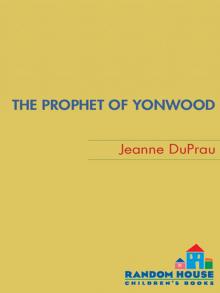 The Prophet of Yonwood
The Prophet of Yonwood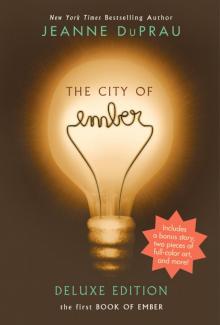 The City of Ember
The City of Ember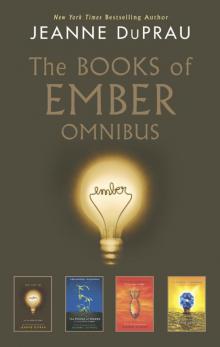 The Books of Ember Omnibus
The Books of Ember Omnibus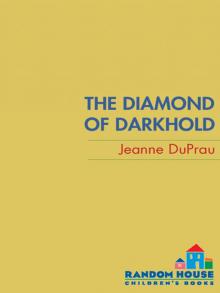 The Diamond of Darkhold
The Diamond of Darkhold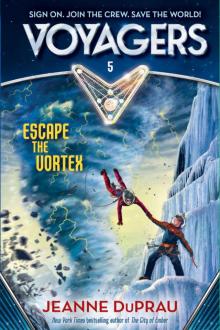 Voyagers: Escape the Vortex (Book 5)
Voyagers: Escape the Vortex (Book 5)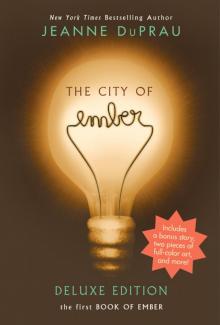 The City of Ember Deluxe Edition
The City of Ember Deluxe Edition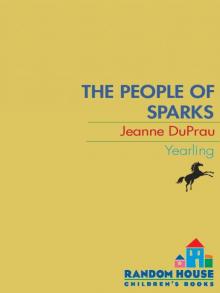 The People of Sparks: The Second Book of Ember (Books of Ember)
The People of Sparks: The Second Book of Ember (Books of Ember)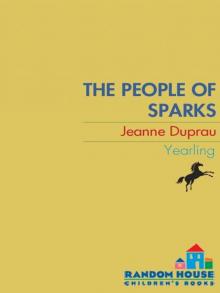 The People of Sparks
The People of Sparks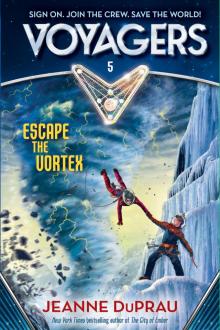 Escape the Vortex
Escape the Vortex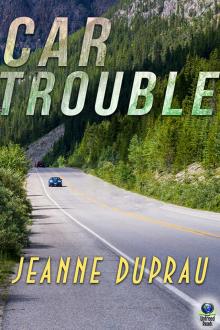 Car Trouble
Car Trouble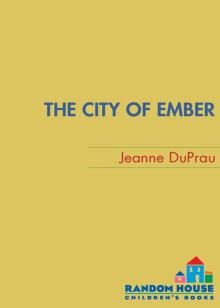 The City of Ember: The First Book of Ember
The City of Ember: The First Book of Ember